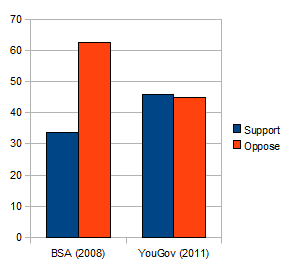Does the majority of the public oppose same-sex marriage?
"When the public are given the facts — when they are told that the rights of marriage are already available through civil partnerships — a majority of the public back traditional marriage."
Coalition for Marriage, 19 February 2012
On Sunday, the former Archbishop of Canterbury Lord Carey announced the launch of the Coalition for Marriage — a campaign petitioning against the government's proposals to introduce marriage for same-sex couples.
In an article published in the Mail on Sunday, Lord Carey writes that: "I do not believe the British public wants any of this. The move to legalise same-sex marriage is undemocratic."
The campaign website echoes this view, arguing that their petition "demonstrates that there is broad public opposition to redefining marriage." This argument is one that has been repeated in several media outlets. For example, today's Independent reports that the campaign has "accused the Government of having no mandate for the move — and claimed the public was on its side".
At the campaign's launch, it was claimed by Colin Hart, the Campaign Director, that "when the public are given the facts — when they are told that the rights of marriage are already available through civil partnerships — a majority of the public back traditional marriage."
However as Full Fact has previously found, the public's views on gay marriage have been misrepresented in the past.
Last year we looked into a claim by the Daily Mail that "most people still oppose gay marriage and the adoption of children by same-sex couples."
Upon closer inspection however it was obvious that those who had responded "don't know" to the survey being reported had been added to the number of people against gay marriage to give a majority.
In fact, the Eurobarometer survey from 2006 cited by the paper showed that 46 per cent agreed that homosexual marriages should be allowed throughout Europe, whilst 45 per cent disagreed, a slim majority in favour.
In 2009 Populus produced a poll where 61 per cent of respondents agreed to some extent with the statement: "Gay couples should have an equal right to get married, not just to have civil partnerships." Some 33 per cent disagreed with the statement.
More recently, YouGov produced a poll in October 2011 giving identical results to those in the Eurobarometer survey: 46 per cent of respondents thought same-sex couples should be allowed to marry, while 45 per cent were opposed.
Again, according to this data the majority appear to support same-sex marriage, but only by a very narrow margin. The YouGov question specifically solicited responses to the statement that: "While civil partnerships offer the same legal rights as marriage, same-sex couples are not able to marry."
So what evidence does the Coalition for Marriage have to support its claims?
Full Fact contacted the campaign to ask just this. They cited two sources: a ComRes poll indicating that 51 per cent were opposed to same-sex marriage, and the British Social Attitudes Survey (BSA) from 2008.
The details of the ComRes poll are now available on their website. The survey asked to what extent respondents agreed with the following statement:
"Since gay and lesbian couples already have the same rights as married couples available to them under civil partnership, they should not be allowed to redefine marriage for everyone else"
51 per cent agreed with this statement, and 34 per cent disagreed.
However it is worth noting that the question does not directly address the issue of whether the respondents agree with same-sex marriage, but rather whether they agree with the argument expressed by the Coalition for Marriage that it would change the definition of the word "marriage" without consulting those already married.
"About how same sex couples should be treated in law. Which comes closest to your view … they should be allowed legally to marry OR should be allowed legally to form civil unions, but not marry OR should not be allowed to obtain legal recognition for their relationships?"
33.7 per cent said they should be allowed to marry, whilst 62.6 per cent said they should not (grouping together the second two responses).
Despite posing a similar question to the previously mentioned YouGov poll, this seems to have thrown up rather different results.

Full Fact contacted polling expert Anthony Wells, who suggested the wording of the question, the manner in which it was asked (be it face-to-face or via computer) and the change of support over time might all contribute to the difference between the figures. He pointed out that it "wouldn't be unusual" for public support for the notion of gay marriage to have increased in the years following the creation of civil partnerships in 2005, as the latter "becomes the status quo".
In the case of the more recent Comres poll, the wording of the questions may well account for the differing results to previous polls. While previous polls have focused on whether or not same-sex couples should have the right to marry, the Comres poll asks if they should be allowed to redefine the concept of marriage "for everyone else".
Conclusion
While both questions may offer different perspectives on the gay marriage debate, whether or not the Comres poll truly reflects public opinion on any change in the law does seem to rely on whether one agrees with the Coalition for Marriage that such a move would 'redefine' marriage in this way.
However the British Social Attitudes survey results from 2008 do seem to conflict more sharply with other polling data. There may be several reasons for these different findings, but given that one might be changing attitudes in recent years, the more recent Populus and YouGov findings may cast some doubt over the BSA results.
So while there could be some evidence to support the Coalition's claim that it enjoys the public's support, it is by no means the only interpretation of the polling data.
--
Front page image attributed to Giovanni Dall'Orto